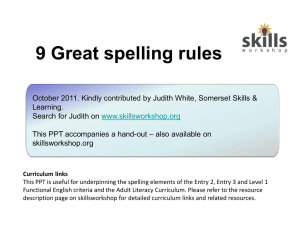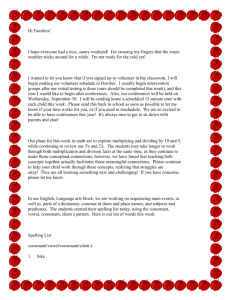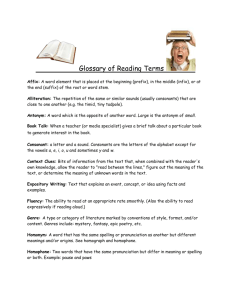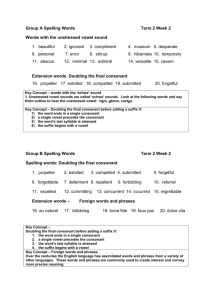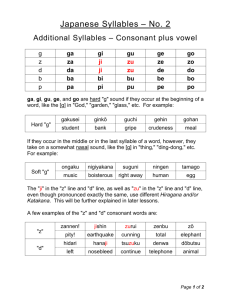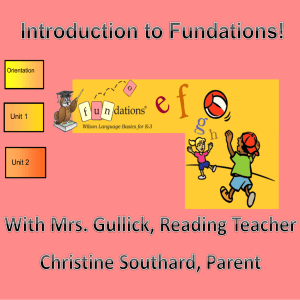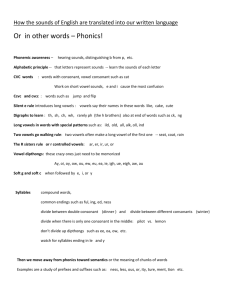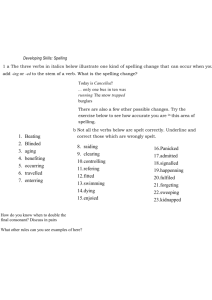difference prosperous secretary primary flattery smuggler formal
advertisement
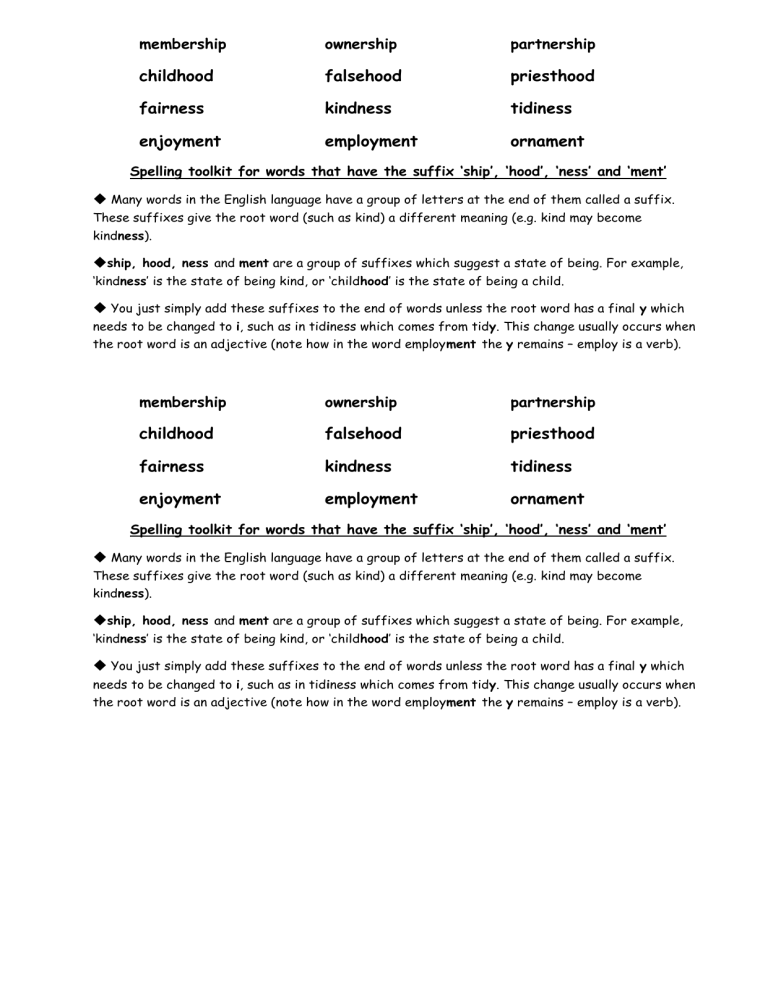
membership ownership partnership childhood falsehood priesthood fairness kindness tidiness enjoyment employment ornament Spelling toolkit for words that have the suffix ‘ship’, ‘hood’, ‘ness’ and ‘ment’ ◆ Many words in the English language have a group of letters at the end of them called a suffix. These suffixes give the root word (such as kind) a different meaning (e.g. kind may become kindness). ◆ship, hood, ness and ment are a group of suffixes which suggest a state of being. For example, ‘kindness’ is the state of being kind, or ‘childhood’ is the state of being a child. ◆ You just simply add these suffixes to the end of words unless the root word has a final y which needs to be changed to i, such as in tidiness which comes from tidy. This change usually occurs when the root word is an adjective (note how in the word employment the y remains – employ is a verb). membership ownership partnership childhood falsehood priesthood fairness kindness tidiness enjoyment employment ornament Spelling toolkit for words that have the suffix ‘ship’, ‘hood’, ‘ness’ and ‘ment’ ◆ Many words in the English language have a group of letters at the end of them called a suffix. These suffixes give the root word (such as kind) a different meaning (e.g. kind may become kindness). ◆ship, hood, ness and ment are a group of suffixes which suggest a state of being. For example, ‘kindness’ is the state of being kind, or ‘childhood’ is the state of being a child. ◆ You just simply add these suffixes to the end of words unless the root word has a final y which needs to be changed to i, such as in tidiness which comes from tidy. This change usually occurs when the root word is an adjective (note how in the word employment the y remains – employ is a verb). hop, hopping, hopped beep, beeping, beeped dine, diner, dinner big, bigger, biggest blast, blasting, blasted hope, hoping, hoped drag, dragging, dragged burn, burner, burning write, writer, writing Spelling toolkit for adding ing, er, ed or est to words which end in a single consonant ◆ Sometimes the final consonant (letters which are not vowels) are doubled when adding suffixes such as in the word hopping (note that the p is doubled from the route word hop). ◆ The final consonant is doubled when it follows a ‘short’ vowel sound (this is where the vowels A,E,I,O,U do not sound like their letter sound like you would hear in the alphabet). For example, in the word big the vowel is i, but it isn’t pronounced I (or eye). Therefore, the final consonant of g is doubled when adding the suffix to make bigger or biggest. ◆ Some words that end in a consonant, such as beep, do not double the final consonant as this consonant follows a long vowel sound. In the case of beep, the vowel sound is ‘ee’, which sounds like the letter E. ◆ Also note that if a root word, such as write, ends in an e then this e is removed when adding the suffix. When this e is removed you must check to see if there is a consonant at the end of the remaining letters that needs to be doubled (if it follows a short vowel sound). For example, dine becomes din when removing the e, and din has a short vowel sound of i so it becomes dinner when adding er (the final consonant of n is doubled). hop, hopping, hopped beep, beeping, beeped dine, diner, dinner big, bigger, biggest blast, blasting, blasted hope, hoping, hoped drag, dragging, dragged burn, burner, burning write, writer, writing Spelling toolkit for adding ing, er, ed or est to words which end in a single consonant ◆ Sometimes the final consonant (letters which are not vowels) are doubled when adding suffixes such as in the word hopping (note that the p is doubled from the route word hop). ◆ The final consonant is doubled when it follows a ‘short’ vowel sound (this is where the vowels A,E,I,O,U do not sound like their letter sound like you would hear in the alphabet). For example, in the word big the vowel is i, but it isn’t pronounced I (or eye). Therefore, the final consonant of g is doubled when adding the suffix to make bigger or biggest. ◆ Some words that end in a consonant, such as beep, do not double the final consonant as this consonant follows a long vowel sound. In the case of beep, the vowel sound is ‘ee’, which sounds like the letter E. ◆ Also note that if a root word, such as write, ends in an e then this e is removed when adding the suffix. When this e is removed you must check to see if there is a consonant at the end of the remaining letters that needs to be doubled (if it follows a short vowel sound). For example, dine becomes din when removing the e, and din has a short vowel sound of i so it becomes dinner when adding er (the final consonant of n is doubled). difference prosperous secretary primary flattery smuggler formal freedom frightening general Wednesday heaven Spelling toolkit for polysyllabic words with unstressed vowels ◆ polysyllabic – more than one syllable. ◆ Unstressed vowels (also known as a schwa) – when a vowel sound is not stressed when read within a word. For example, the i in business is not stressed (it may sound like busyness if you did!) ◆ It’s tricky to learn how to spell these words. However, if you use related words (e.g. station for stationary) then you may only have a small part of a word to learn. You may also remember the spelling if you say the words how they may sound if they didn’t have the schwa (e.g. Wednesday – sounds like wed-nes-day). difference prosperous secretary primary flattery smuggler formal freedom frightening general Wednesday heaven Spelling toolkit for polysyllabic words with unstressed vowels ◆ polysyllabic – more than one syllable. ◆ Unstressed vowels (also known as a schwa) – when a vowel sound is not stressed when read within a word. For example, the i in business is not stressed (it may sound like busyness if you did!) ◆ It’s tricky to learn how to spell these words. However, if you use related words (e.g. station for stationary) then you may only have a small part of a word to learn. You may also remember the spelling if you say the words how they may sound if they didn’t have the schwa (e.g. Wednesday – sounds like wed-nes-day). difference prosperous secretary primary flattery smuggler formal freedom frightening general Wednesday heaven Spelling toolkit for polysyllabic words with unstressed vowels ◆ polysyllabic – more than one syllable. ◆ Unstressed vowels (also known as a schwa) – when a vowel sound is not stressed when read within a word. For example, the i in business is not stressed (it may sound like busyness if you did!) ◆ It’s tricky to learn how to spell these words. However, if you use related words (e.g. station for stationary) then you may only have a small part of a word to learn. You may also remember the spelling if you say the words how they may sound if they didn’t have the schwa (e.g. Wednesday – sounds like wed-nes-day).
